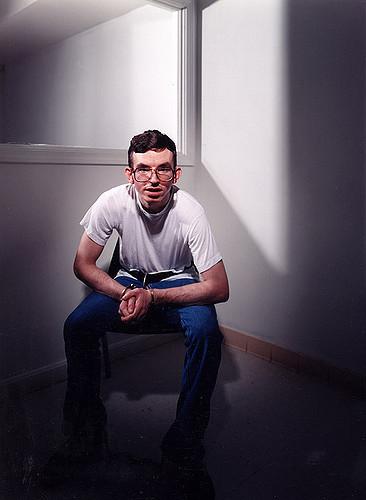After A Murder Conviction is Reversed, Police Chief Vows to Watch Defendant ‘Til the Day I Die’
Did a Louisiana police chief and a prosecutor cross a line when they issued televised threats to a man who’d just been granted relief by a federal appeals court in a child killing?

A Louisiana police chief stared into the television camera and issued a warning to a man whose conviction in a decades-old child killing had just been reversed by a federal court: “Ricky, listen to me you little piece of shit,” he said, “’til the day I die, I’ll be watching you.”
In a recent interview with KPLC, the Lake Charles NBC affiliate, Lake Charles Police Chief Don Dixon made the threats against Ricky Langley, a Calcasieu Parish man who confessed during an interrogation to the 1992 murder of a 6-year-old named Jeremy Guillory.
Calcasieu Parish prosecutors tried Langley three times for the boy’s murder. At his first trial, Langley was convicted and sentenced to death, but those proceedings were nullified after it was found that the judge presiding over the grand jury selected the foreperson based on race. In the second trial, Langley was acquitted of first-degree murder—defined by Louisiana law as killing a human being with specific intent to kill or to inflict great bodily harm while committing an aggravated felony, or when the individual kills a person under the age of twelve or older than 65, which is considered an aggravating circumstance—after his attorneys argued that he could not form “specific intent” because he was mentally incapable of doing so. The jury returned a guilty verdict on second-degree murder, a lesser offense. But when Langley’s defense team appealed, he was granted a new trial. At the third trial, prosecutors retried Langley on the second-degree murder charge, which his attorneys said violated the double jeopardy clause—but he was nonetheless convicted.
The day before Dixon’s fiery interview, the U.S. Court of Appeals for the Fifth Circuit ruled that Langley’s second-degree-murder conviction from the third trial was invalid because a jury in the second trial rejected the state’s claim that Guillory acted with specific intent, therefore precluding prosecutors from getting a second bite at the apple on that issue in a third trial. The decision sets up a possible fourth trial for Langley on manslaughter charges, and now defense attorneys and legal ethics experts say that Dixon’s KPLC comments raise ethical concerns that he has prejudiced pretrial proceedings.
Such concerns are backed by ethical guidelines for prosecutors. According to American Bar Association guidelines, prosecutors should not make or authorize extrajudicial statements that would have a substantial likelihood of prejudicing a criminal proceeding; they are also ethically bound to prevent law enforcement personnel from doing so. The Louisiana Rules of Professional Conduct has similar language about the role prosecutors have in reining in such statements by law enforcement. Rule 3.8(f) states that prosecutors should “exercise reasonable care to prevent investigators, law enforcement personnel, employees or other persons assisting or associated with the prosecutor in a criminal case from making an extrajudicial statement.”
Dane S. Ciolino, a law professor at Loyola University in New Orleans who edits the blog Louisiana Legal Ethics, said Dixon has possibly crossed an ethical line with his rant about Langley, referring to the standards set by Louisiana’s rules of professional conduct stating that prosecutors shouldn’t make any comments before trial that are likely to increase public condemnation of the accused.
“That’s the real problem with that kind of comment,” Ciolino told The Appeal. “There used to be press conferences with dope and guns after arrests were made, and you don’t see those so much anymore because people understand that it’s inappropriate to do anything that increases the public condemnation of the accused prior to trial. … Most prosecutors and law enforcement officers understand their obligations.”
Ciolino adds that “prosecutors have to rein the [police chief] in,”and he places responsibility for Dixon’s comments squarely at the feet of Calcasieu Parish prosecutors.
Indeed, Calcasieu Parish District Attorney John DeRosier sat beside Dixon during the KPLC interview and made similar condemnations of Langley. “We are going to use every resource this office has, as long as it takes, as much as it costs, to keep this horrible killer, this murderer, in prison for the rest of his life,” DeRosier said. “Because this individual will kill again. He has said he will kill again. And we have people to whom he has said that.”
In response to an interview request from The Appeal, DeRosier’s office issued the following statement on possible ethical violations committed by DeRosier and Dixon during the KPLC interview: “The proper venue to raise and resolve an allegation of prejudicial pretrial publicity is within the confines of the courts—not in the media. That is how we will address any such allegations if and when they arise.”
The Lake Charles Police Department did not respond to requests for comment.
Potential disciplinary sanctions for prosecutors for engaging in prejudicial conduct include disbarment, suspension, or admonition by the state’s bar association, though it’s worth noting that they are rarely disciplined for misconduct.
Ciolino says that regardless of whether disciplinary action is taken against Dixon or DeRosier, he expects the defense to seek a gag order on Dixon and possibly a motion for a change in venue. Dixon and DeRosier’s statements, he says, “just cause needless trouble in the conduct of the proceeding.”
